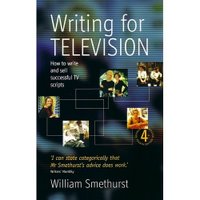 Since starting the MA course I've acquired a shelf-load of tomes of varying values. The latest I'd added to the stack is Writing for Television [4th Edition] by William Smethurst, published last year by How To Books [ISBN: 1845280261]. Grud, I wish I'd read this before I decided to spend a month writing a Doctors spec script several years ago! It wouldn't have made my writing much better, but it would have persuaded not to send a spec script for an existing show to that show. The book is full of useful advice about writing for TV and how to break in. There are no magic formula, just a lot of common sense and knowledge gleaned from Smethurst's years in the industry. [He worked on Boon, radio soap The Archers and devised the short-lived BSB space soap Jupiter Moon].
Since starting the MA course I've acquired a shelf-load of tomes of varying values. The latest I'd added to the stack is Writing for Television [4th Edition] by William Smethurst, published last year by How To Books [ISBN: 1845280261]. Grud, I wish I'd read this before I decided to spend a month writing a Doctors spec script several years ago! It wouldn't have made my writing much better, but it would have persuaded not to send a spec script for an existing show to that show. The book is full of useful advice about writing for TV and how to break in. There are no magic formula, just a lot of common sense and knowledge gleaned from Smethurst's years in the industry. [He worked on Boon, radio soap The Archers and devised the short-lived BSB space soap Jupiter Moon].Where the book falls down is the constant use of shows from Smethurst's career as examples, particularly Jupiter Moon. That programme quietly died in 1991, making the text seem dated and behind the times. In truth, this revised edition is sprinkled with far more up to date references, but the constant referring back to Jupiter Moon [all the photos on the blandly designed cover are from that show] becomes wearisome. The book was published in February 2005, and in the fast-moving world of TV events have moved on since then. The rise of younger indies like Kudos and Red goes unmentioned, while including URLs for useful websites in reference books should always come with a caveat about how quickly such info can become out of date.
Despite these gripes, I think Writing for Television is worth it's £9.99 cover price - buy it from an online retailer were you can shave three quid off that price. A useful addition to my bookshelf.
2 comments:
Totally agree, lots of solid, useful (and UK relevant) advice, backed up by strangely antiquated examples. How many readers will even have heard of Jupiter Moon, or Boon for that matter?
Hey there David
Why would it have convinced you not to write a spec for Doctors? I've been considering doing just such a thing when I finish with current novel deadline.
Paul
Post a Comment